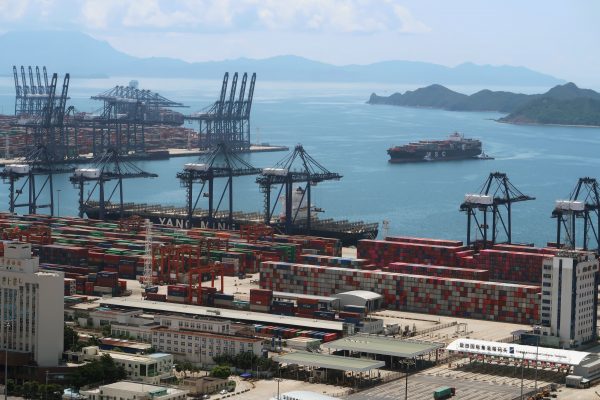True, Asia is home to the Regional Comprehensive Economic Partnership (RCEP) and the Comprehensive and Progressive Agreement for Trans-Pacific Partnership, and most Asian countries generally have more open attitudes towards trade than the United States and Europe. But ‘most’ is not all, and trading states are not always free trade states. The most important exceptions are India and China. These giants represent huge deviations that far outweigh middle-power free traders like Japan, South Korea and Australia, let alone small economies like Singapore and Taiwan.
Indian and Chinese attitudes towards free trade are ambivalent if not downright mercantilist. India and China respond primarily to their own imperatives and according to their own dynamics. Neither are likely to evolve teleologically, forever up and on towards ever-freer trade.
The hope of Narendra Modi’s election as prime minister in 2014 was based on an extrapolation from the business-friendly environment he was said to have nurtured in Gujarat. But being business-friendly is not the same as being trade-friendly. India’s withdrawal from RCEP is proof that trade liberalisation is not a priority of Modi’s economic agenda.
What matters most to Modi and the Bharatiya Janata Party (BJP) is power. The ultimate source of power is money, which is the sine qua non of electoral success in India. Modi needs to please Indian, not foreign, business. Indian businesses are not instinctively free traders, particularly the small businesses that are the backbone of the BJP’s base. These small businessmen are happy with India’s licence raj system because their skill at navigating that labyrinth gives them an advantage over foreign competitors. That China seems to have become skilled at this game — witness India’s trade deficit with China — is a political complication for the BJP.
Modi has not even always found it necessary to pursue economic rationality, let alone free trade orthodoxy, to hold on to power and secure Indian business support. Many of his policies such as demonetisation were economic failures but political successes.
Still, India is open compared to China. The most salient fact about Chinese economic policy is that it carries the baggage of communism. China’s origins were as a Leninist state led by the Leninist-style Chinese Communist Party (CCP).
A Leninist party’s primary value is control. The CCP claims absolute control over all dimensions of state and society. President Xi Jinping enforces this more thoroughly than all his immediate predecessors. The CCP’s overriding interests, coupled with assertive ethnonationalism, are the root of many of China’s economic and geopolitical behaviours that have aroused concerns.
The purpose of economic reform in China is always to preserve that system. This was the primary reason for ‘reform and opening up’ under Deng Xiaoping, as well as his successors. China is undoubtedly one of the chief beneficiaries of the open trading system, but China will uphold the values of free trade only if they reinforce the Leninist system and the CCP’s interests.
Insofar as China achieves greater self-sufficiency under the new approach of ‘dual circulation’, the mercantilist element in Chinese trade policy will be enhanced because Beijing will have even less reason to abide by international norms unless it suits the CCP’s interests.
There is no practical alternative to CCP rule. Other alternatives pose greater challenges. Imagine a multi-party China whose political dynamic is driven by assertive ethnonationalism. Any analysis of trade in ‘Asia’ confronts a paradox: China is one of the main locomotives of the region’s growth, but it is also at the heart of the instabilities and imbalances that threaten to derail the region’s growth.
Nor can the rest of Asia claim superior virtue, except in relative terms. Complaints about Japanese and South Korean unfair trade practices are legion. Even Australia and Singapore, who like to think of themselves as upholders of free trade, can do so only by ignoring the beams in their own eyes.
Domestic politics are the primary source of pressure on the international trading system. We must each manage our own politics the best we can, and no one is handling them particularly well. It is difficult to imagine ‘reinventing’ the global trading system unless the United States and major European economies change their attitudes.
China is better placed to pursue long-term goals. But authoritarian systems have their shortcomings. They have an advantage only if decisions are correct in the first place. Deng’s decision to reform was correct; Mao Zedong’s ‘Great Leap Forward’ and Cultural Revolution were disasters. Xi’s abandonment of Deng’s approach of ‘hiding capabilities and biding time’ was a strategic mistake. Once revealed, ambitions are not easily forgotten and inevitably provoke counter-reactions.
Not all problems have solutions; not everything desirable is achievable. Bereft of leadership from either East or West, the international trade regime will stumble along sub-optimally for the foreseeable future. But it is unlikely to entirely collapse, provided ad hoc and flexible coalitions of the like-minded — from which China should not be a priori excluded — pragmatically calculate risk and opportunity and manage particular issues, rather than chase the chimaera of definitively ‘reinventing’ global trade.
Bilahari Kausikan is Chairman of the Middle East Institute, an autonomous institute of the National University of Singapore.
An extended version of this article appears in the most recent edition of East Asia Forum Quarterly, ‘Reinventing global trade’, Vol 13, No 2.

